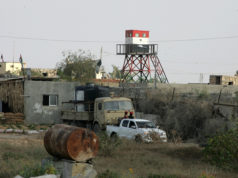Coptic Christians worldwide are on high alert this week for possible copycat attacks ahead of their Christmas celebrated on Friday after Islamic radicals online hailed the deadly New Year’s bombing in Egypt, which killed 23 people, calling for more attacks on Coptic churches in other countries.
Few details on the attack have been disclosed. Four days later, it remains unclear if it was a car or suicide bombing, and while Egypt’s government initially blamed foreigners and even al-Qaeda, government-owned newspapers recently reported that the investigation is focusing on local militants. Not surprisingly, a coalition of Egyptian lawyers accused Israel of being behind the terror attack.

The New Year’s church bombing in Alexandria, Egypt |
|
The bombing, the worst attack on Christians in Egypt in over a decade, sparked riots and protests across the country by Egypt’s Christian minority, who feel they are discriminated against and not adequately protected by the government. “The Copts suffer from unequal legislation which makes it harder for them to build places of worship, they cannot occupy high-ranked posts in all state bodies, and were marginalized in candidate lists for the ruling party in the last election,” said Yousef Sidhoum, editor of the Coptic newspaper, al-Watani.
Indeed, this is not only the case in Egypt, but across much of the Middle East. Once home to large populations, and sometimes majorities – as was the case in Lebanon – of Christians and Jews, the Middle East of today has witnessed a diminishing level of tolerance for religious minorities, endangering not only the lives of those who adhere to the religion, but also the centuries of history and culture attached to them.





